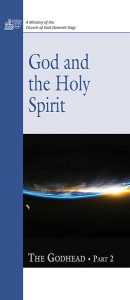
The Holy Spirit
The Holy Spirit is the promised divine helper who proceeds from the Father and Son. The Spirit is God’s presence and power in the world and indwells believers. By the Holy Spirit, God inspired and illuminates the Scriptures; convicts and regenerates sinners; sanctifies, teaches, comforts, guides, and preserves believers and empowers them for service. Evidence of the Holy Spirit in the believer’s life is faith in Christ, obedience to God, and the spiritual fruit of love.
Throughout the Bible
The one true God who has revealed Himself as a personal Father and Son now comes to the world and dwells within His people through the Spirit. The Bible texts speak of this divine agency in various terms: e.g., Holy Spirit, the Spirit, the Spirit of God, the Spirit of Truth, and the Spirit of Christ. All of these refer to the same entity.
The Holy Spirit’s work as God’s divine representative and personal presence in the world is well established in Scripture. Consider: God’s creation was facilitated by His Spirit (Genesis 1:2). God told Moses that He had filled Bezalel with His Spirit to enable him in all kinds of craftsmanship for the work of building the tabernacle (Exodus 31:1-5). Samson obtained his great strength by the Spirit of the Lord (Judges 14:6; 15:14). Saul was filled with the Spirit of God and prophesied (1 Samuel 10:10). The Spirit of the Lord came upon David as Samuel anointed him King of Israel (1 Samuel 16:13).
The Holy Spirit confirmed Jesus’ identity to John the Baptist following His baptism (Matthew 3:16, 17; Mark 1:10, 11; Luke 3:22; John 1:32-34). The same Spirit that dwelt in Christ without measure has now been given to dwell in the hearts of God’s saints until the Lord returns to establish His kingdom (John 7:37-39; Acts 2:38, 39). The Holy Spirit reveals Jesus as the Christ (1 Corinthians 12:3). Peter and Paul described the role of the Holy Spirit in the origin of God’s written Word (2 Peter 1:21; 2 Timothy 3:16).
The promise, the coming
The most detailed promise of the coming of the Spirit is found in the prophet Joel (2:28-, 29): “I will pour out my Spirit on all people. . . . Even on my servants, both men and women, I will pour out my Spirit in those days.” Other Hebrew prophets also spoke of the Spirit’s coming (Isaiah 44:3; Ezekiel 36:27; 39:29).
John the Baptist, who prepared the way for Messiah (Mark 1:1-4), spoke of baptism in the Spirit: “After me will come one more powerful than I . . . I baptize you with water, but he will baptize you with the Holy Spirit” (Mark 1:7, 8; Matthew 3:11; Luke 3:16). Jesus promised the Holy Spirit would be given to all who believed in Him (John 7:37, 39).
After Jesus’ resurrection, He instructed the disciples not to leave Jerusalem but to “Wait for the gift my Father promised, which you have heard me speak about. For John baptized with water, but in a few days you will be baptized with the Holy Spirit” (Acts 1:4, 5; Luke 24:49).
These promises were fulfilled on the Day of Pentecost, recorded in Acts 2, when the Spirit came to dwell with Jesus’ disciples in a personal and permanent way. While the Spirit had filled or anointed individuals in Old Testament times, He was given uniquely by Jesus Christ and remains upon and within Jesus’ followers (John 14:17; Romans 8:9; 1 John 2:27). Rather than taking the place of the ascended Christ, the Holy Spirit actually provides Jesus’ presence in the church until He returns. This He does by indwelling and transforming each believer, as summarized in John 14:17, 18; Romans 8:11; 1 Corinthians 3:16; and 2 Corinthians 3:17, 18.
Divine Helper
Jesus referred to the Holy Spirit as the Helper, Advocate, Comforter, and Counselor. These terms are translated from the Greek word paraklete, which literally means “to be called alongside to provide needed aid or assistance.”
In his last recorded teaching before His death on the cross, Jesus told the disciples just what kind of assistance the Holy Spirit would provide, and how:
- He would come to live with us and remain here (John 14:16-18; Matthew 28:20).
- He would teach and remind us of all things Jesus said (John 14:26; 1 John 2:27).
- He would guide Jesus’ followers into all truth (John 16:13; 1 John 2:27).
- He would speak what the Father and Son tell Him, about things future (John 16:13).
- He would convict the world about sin, righteousness, and judgment (John 16:8-11).
Later, the apostle Paul further described the helping ministry of the Spirit. The Spirit . . .
- enables believers to obey God (Romans 8:5-9, 13);
- intercedes to help believers overcome weaknesses (v. 26);
- testifies of Jesus (1 Corinthians 12:3; see Matthew 16:16, 17);
- distributes spiritual gifts for the church’s edification (1 Corinthians 12:7-11);
- produces spiritual fruit in the lives of believers (Galatians 5:22-25);
- guarantees God’s intention to redeem the saints and bestow eternal life upon them (2 Corinthians 1:21, 22; Ephesians 1:13, 14);
- preserves believers until Jesus returns (2 Corinthians 1:21, 22);
- sanctifies believers (Romans 15:15, 16; 2 Thessalonians 2:13; 1 Peter 1:2).
Gospel works, fruits, gifts
Just before His departure, Jesus assured His disciples that, when the Spirit came upon them, they would be empowered to do God’s work in the world: “You will receive power when the Holy Spirit comes on you; and you will be my witnesses . . .” (Acts 1:8). We see the fulfillment of this promise in the book of Acts as God bestowed gifts upon, and worked miracles through, the believers. The Epistles testify to God’s enduring design that the church be a miraculously gifted body that edifies itself, as well as ministers to the outside world.
Through the Holy Spirit, God also works in believers’ lives to perfect godly character that reflects the divine nature of Christ. “His divine power [Spirit] has given us everything we need for life and godliness . . . (2 Peter 1:3; also 4-8). Paul describes the qualities we need as the “fruit of the Spirit” (Galatians 5:22, 23).
God works for the salvation of humanity through His church, empowered by the Spirit. The Spirit distributes spiritual gifts to equip and enable the church to carry out its many ministries (1 Corinthians 12:1-11, 27-31).
The Holy Spirit both inspired the writing of God’s Word (2 Peter 1:20, 21; 2 Timothy 3:16, 17) and illuminates the Scriptures (John 14:26; 15:26; 16:13; 1 Corinthians 2:14; 1 John 2:27).
The Spirit convicts sinners. Jesus described the work of the Counselor that was to come: “He will convict the world of guilt in regard to sin and righteousness . . .” (John 16:8). An example of this conviction by the Spirit occurred during Peter’s sermon on the Day of Pentecost: “When the people heard this, they were cut to the heart [convicted] and said to Peter and the other apostles, ‘Brothers, what shall we do?’” And “Those who accepted his message were baptized . . .” (Acts 2:37, 41).
Regeneration (new birth) of sinners in the Scripture is a work of the Holy Spirit. Jesus advised Nicodemus that he must undergo a spiritual rebirth to see the kingdom of God: “No one can enter the kingdom of God unless he is born of water and the Spirit” (John 3:3, 5; see also Romans 8:13, 14; Titus 3:5).
The Spirit not only teaches God’s Word (John 14:26; 16:13) but also guides and directs believers. The Spirit directed the apostle Paul to go to Macedonia instead of Bithynia (Acts 16:6-10; see also Matthew 4:1; Luke 4:1).
Paul recognized that God empowered believers to preach the gospel of Christ through spiritual gifts distributed by the Holy Spirit (1 Corinthians 12:4-11; Ephesians 4:11-13; see also Acts 10:37, 38).
The evidence: faith, obedience, love
A key question we must consider here is how does one know that he/she has received the Holy Spirit?
The first answer that can be given with confidence is this: We know that we have received of God’s Spirit when we truly trust in Christ and confess Him as the Lord and Savior of our lives. This is supported by Paul’s words: “No one can say, ‘Jesus is Lord,’ except by the Holy Spirit” (1 Corinthians 12:3b; see also John 14:17; Galatians 3:5, 14; 1 John 4:2).
The converse of this link between faith and the Spirit is seen in Romans 8:9b: “Now if anyone does not have the Spirit of Christ, he is not His” (NKJV).
A second biblical evidence of the indwelling Spirit is walking in the way of spiritual obedience to God and His Word. The Scriptures equate persistent disobedience with resisting the Spirit (Acts 7:51), grieving the Spirit (Ephesians 4:30), and quenching the Spirit (1 Thessalonians 5:19, NKJV).
The apostle John drew a strong link between receiving the Spirit and keeping God’s commands: “Now he who keeps His commandments abides in Him, and He in him. And by this we know that He abides in us, by the Spirit whom He has given us” (1 John 3:24, NKJV; see also Acts 5:32).
The clearest indicator that one has received of God’s Spirit and is walking therein is the spiritual fruit of love. Paul gives preeminence to love in his list of Spirit’s fruit, in Galatians 5:22-23. These spiritual virtues comprise the very character of God (1 John 4:8, 16).
For Paul love is the “more excellent” way (1 Corinthians 12:31). Above all other spiritual gifts, he devoted chapter 13 to the excellence of love: “And now these three remain: faith, hope and love. But the greatest of these is love” (v. 13).
Jesus affirmed that love is the supreme test. In the same context that He introduced the Holy Spirit as the divine Helper from heaven (John 14, 15, 16), He instructed His disciples, “By this all men will know that you are my disciples, if you love one another” (13:35).
Holy Spirit: nature and person?
Is the Holy Spirit, then, a third person of the Godhead, as the Father and Son are persons? There is no simple answer to this question, nor a complex formula by which the Christian Deity may be fully analyzed and finally summarized.
Since God is holy and God is Spirit, we should think of the Holy Spirit as identified with God in the closest possible way. When the Holy Spirit moves, we rightly say, “God is moving among His people.” The Holy Spirit is divine — not human and not “another God.” Rather than an impersonal “force” or “extension” of God, the Holy Spirit should be regarded as God’s personal presence with and within His people on earth.
When we speak of God in heaven — transcendent and wholly other — we think of the Father. When we speak of God on earth — imminent and known in human terms — we think of the Son. When we speak of God omnipresent — at work in the world and in our hearts — we think of the Holy Spirit. Still, we confess only one true and living God who has become all things to His people.
Consider this evidence. The Holy Spirit is not mentioned in most New Testament salutations, benedictions, or doxologies (as are the Father and Son). The Holy Spirit is not pictured as enthroned or reigning in heaven (as are Father and Son). The Holy Spirit is not recorded as being worshipped or addressed in prayers (as are Father and Son). The Holy Spirit has no recorded “I-Thou” communications with Father or Son (as they do with each other). Thus, it is better to think of the Spirit as the personal presence of the Father and Son on earth and within believers, rather than as a third person of the Godhead in the same sense as Father and Son.
